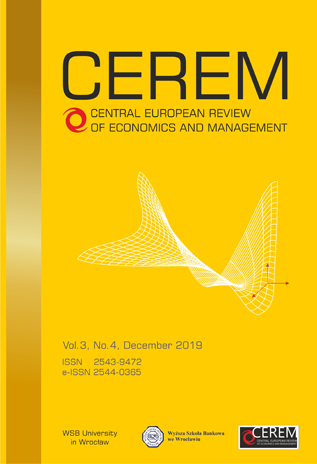The impact of foreign trade on the Netherlands’ real CO2 emissions
DOI:
https://doi.org/10.29015/cerem.780Abstrakt
Aim: CO2 emissions and the related climate change are a global problem, where the direct impact of actions of individual countries depends on their total share in CO2 emissions. In order to assess the potential for policy measures, the openness of an economy, and the related import and export and their impacts on emissions should be considered. The aim of this paper is the attempt to show the real CO2 emissions of the Netherlands as well as the impact of its trade on CO2 emissions in other countries in the world and in the EU in 2015.
Design / Research methods: This study was conducted on the group of countries that are the major emitters of CO2 in the world including most of the EU members. Countries with negligible CO2 emissions were omitted. Actual CO2 emissions were obtained by applying the actual emission factor. This takes into account the transfer of CO2 in export products and services as well as those imported by particular countries.
Conclusions / findings: The real CO2 emissions in the Netherlands are significantly different from the gross values, which represent the CO2 emissions in the particular countries. It is also important to indicate that isolated actions of a single country within the European Union itself do not deliver the intended global and regional target – significant CO2 emissions reduction. The approach proposed in this study, when applied, may have serious implications for individual EU member states in implementing their energy policy objectives.
Originality / value of the article: The article shows a different approach to the issue of CO2 emission, including the importance of international trade in a globalizing world.
Bibliografia
Bogrocz-Koczwara M., Herlender K., 2008, Bezpieczeństwo energetyczne a rozwój odnawialnych energii, Energetyka nr.3. Cytowane jako: [Bogrocz 2008]
Fortuński B., 2013, Wyzwania i problemy zrównoważonego rozwoju w energetyce światowej w kontekście polityki energetycznej UE, [w:] Handel wewnętrzny, red. B. Kryk, IBRKK, Warszawa. Cytowane jako: [Fortuński 2013]
Fortuński B., 2013, Wykorzystanie wybranych surowców energetycznych w kontekście polityki energetycznej Unii Europejskie, [w:] Efektywne gospodarowanie zasobami przyrodniczymi i energią, red. A. Graczyk, Prace Naukowe Uniwersytetu Ekonomicznego we Wrocławiu, nr 3017, Wrocław. Cytowane jako: [Fortuński 2013a]
Fortuński B., 2012, „Wyniki” proekologicznego podejścia do energetyki w Unii Europejskiej w oparciu o model EFQM, [w:] Orientacja na wyniki we współczesnej gospodarcze, red. T. Borys, P. Rogala, Prace Naukowe Uniwersytetu Ekonomicznego we Wrocławiu, nr 3017, Wrocław. Cytowane jako: [Fortuński 2012]
Fortuński B., 2016, Polityka energetyczna Unii Europejskiej – 3x20. Diagnoza i perspektywy w kontekście zrównoważonego rozwoju, [w:] Ekonomia środowiska i polityka ekologiczna, red. A. Becla, K. Kociszewski, Prace Naukowe Uniwersytetu Ekonomicznego we Wrocławiu, nr 453, Wrocław. Cytowane jako: [Fortuński 2016]
Fortuński B., 3 (11) 2016, Wpływ handlu zagranicznego Unii Europejskiej na rzeczywista emisję CO2, [w:] Ekonomia XXI Wieku, red. W. Michalczyk, Wydawnictwo Uniwersytetu Ekonomicznego we Wrocławiu. Cytowane jako: [Fortuński 2016a]
Fortuński B., 2016, Globalna sprawiedliwość a polityka energetyczna Unii Europejskiej, [w:] Globalna sprawiedliwość, red. O. Janikowska, J. Słodczyk, Wydawnictwo Uniwersytetu Opolskiego, Opole. Cytowane jako: [Fortuński 2016b]
Bielecki S., Zalewski P., Fortuński B., Wybrane Problemy zarządzania energetyką, Wydawnictwo Texter, Warszawa 2016. [TX]
Graczyk A., Jakubczyk Z., 2005, Rozwój rynku energii elektrycznej w Polsce w kontekście integracji z Unią Europejską, Prace Naukowe Akademii Ekonomicznej we Wrocławiu nr 1056, Wydawnictwo AE, Wrocław. Cytowane jako: [Graczyk, Jakubczyk 2005]
IEA, 2016, CO2 EMISSIONS FROM FUEL COMBUSTION Highlights (2015 Edition), IEA. Cytowane jako: [IEA 2016].
Kaczmarski M., 2010, Bezpieczeństwo energetyczne Unii Europejskiej, Wydawnictwa Akademickie i Profesjonalne, Warszawa. Cytowane jako: [Kaczmarski 2010]
Knoema 2015, World GDP Ranking 2015, (http://knoema.com/nwnfkne/world-gdp-ranking-2014-data-and-charts, 02.09.2014). Cytowane jako: [Knoema 2015]
Kryk B., 2012, Kontrowersje polskiej polityki energetycznej w kontekście realizacji wymogów unijnych, Ekonomia i Prawo, t. XI Integracja i dezintegracja w sektorze realnym, UMK, Toruń. Cytowane jako: [Kryk 2012]
Kryk B. 2012, Wzrost efektywności energetycznej – wyzwanie inwestycyjne dla polskiego sektora energetycznego, [w:] Kapitał ludzki i społeczny w rozwoju regionalnym, t. I, red. Ł. Dymek, K. Bedrunka, Politechnika Opolska, Opole. Cytowane jako: [Kryk 2012a]
http://atlas.media.mit.edu/en/profile/country/deu/#Exports . Cytowane jako:[AM]
http://data.worldbank.org/data-catalog/world-development-indicators Cytowane jako: [WB]
Pobrania
Opublikowane
Numer
Dział
Licencja
Autor przenosi nieodpłatnie na Wyższą Szkołę Bankową we Wrocławiu , bez ograniczeń terytorialnych, majątkowe prawa autorskie do tego utworu w rozumieniu ustawy z dnia 4 lutego 1994 roku o prawie autorskim i prawach pokrewnych ( Dz.U. 1994, Nr 24, poz. 83 ze zm. )na zasadzie wyłączności, tj. prawo do:
a) wyłącznego używania i wykorzystania utworu w dowolnej działalności przez Wyższą Szkołę Bankową we Wrocławiu, w szczególności w działalność Biblioteki Cyfrowej uruchomionej przez Wyższą Szkołę Bankową we Wrocławiu
b) wytwarzania, utrwalania i zwielokrotniania egzemplarzy utworów wszelkimi technikami, w tym techniką drukarską, reprograficzną, zapisu magnetycznego oraz techniką cyfrową, w szczególności ich zwielokrotniania poprzez dokonywanie zapisów na płytach typu CD,
c) zamieszczenia wybranych fragmentów utworu w celach promocyjnych w publikacjach, materiałach promocyjnych, w sieci Internet oraz sieciach wewnętrznych typu Intranet Wyższej Szkoły Bankowej we Wrocławiu,
d) wprowadzania utworu do pamięci komputera Wyższej Szkoły Bankowej we Wrocławiu,
e) kopiowania i powielania utworu w technologiach fotomechanicznych lub innych znanych w dniu zawarcia umowy (fotokopie, kserokopie itp.),
f) przetworzenia dzieła na formę elektroniczną i nieograniczonego rozpowszechniania w sieci Internet.


